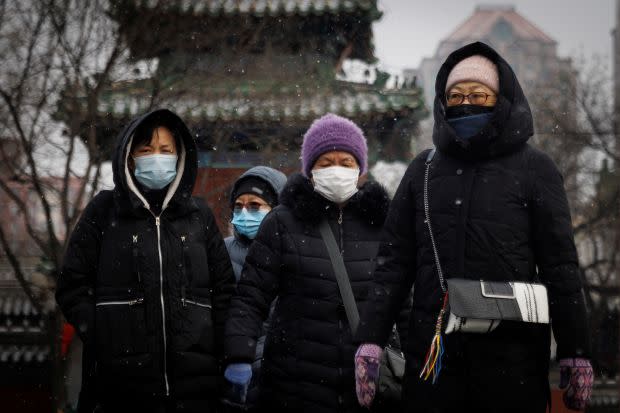Beijing ramps up covid-19 testing ahead of Olympics

With less than two weeks until the start of the 2022 Winter Olympics, Beijing is struggling to keep covid at bay.
Nine new cases had been identified in the city on Jan. 22, according to a Jan. 23 news briefing from China’s National Health Commission. Those numbers are low compared to a city like New York, which had nearly 15,000 positive cases that same day, but they’re more than zero, which has been China’s approach to covid since early in the pandemic.
Six of Beijing’s nine cases were in the Fengtai district, home to some 2 million residents and located southwest of the city center; local officials there announced that they would be testing all residents and asked them to avoid large gatherings and to stay put instead of traveling to Lunar New Year celebrations later this week. Chinese officials suspect that early cases of the omicron variant arrived via a package shipped from overseas (epidemiologists in the US and Canada have said this is unlikely); they’re asking anyone who developed symptoms within 14 days of receiving a package to get tested.
Testing China’s “zero covid” policy
Throughout the pandemic, China has had some of the strictest testing and quarantine policies in the world. As of Jan. 13, 20 million people were in some form of lockdown, according to NPR. That has likely contributed to the relatively low numbers of covid cases and deaths the country has reported, though many believe those numbers to be underestimations. Beijing only reported its first locally transmitted case of the omicron variant on Jan. 15, months after the variant has peaked in countries such as South Africa, the UK, and the US.
But many have wondered how long China will be able to continue its so-called “zero covid” or “zero tolerance” policy. Its attempts to stop the virus’ spread have become “more frenzied” recently, according to the Washington Post; officials have forced people to suddenly quarantine in the middle of shopping excursions, business meetings, and dates. Now, omicron is spreading locally even as athletes arrive from all over the world for the Olympics, which start Feb. 4.
“At this point, [the “zero covid” policy is] really almost like a last-ditch, or certainly very stubborn and persistent, effort to stave off the virus. They are really stuck,” Dali Yang, a professor of political science at the University of Chicago, told the New York Times.
These new efforts in Beijing, in addition to additional rules for the Olympics, may not be enough to shut covid out completely. There’s no telling how long the country will practice this approach, though some experts speculate that leaders are waiting for better vaccines or milder strains to change course. Everyone agrees, though, that someday China will stop trying to shut the virus out completely and instead learn to live with it.
Sign up for the Quartz Daily Brief, our free daily newsletter with the world’s most important and interesting news.
More stories from Quartz:
